Bunbury Cathedral Grammar School
Vocational
Post

Vocational
Post
Bunbury Cathedral Grammar School is a co-educational, Anglican, day and boarding School offering a comprehensive education pathway from Early Education and Care to Kindergarten through to Year 12. Established in 1972 by Bishop Ralph Hawkins and the South West community, the School was the first independent, Anglican, co-educational day and boarding school in rural Australia. Over 52 years, the School has grown into a vibrant and inclusive institution, recognised both nationally and internationally.
Located in Gelorup, Western Australia, Bunbury Cathedral Grammar School occupies a 33-hectare campus of natural bushland. This expansive and unique setting provides an environment that enhances both academic pursuits and personal development, offering a balance of structured learning and opportunities for spiritual, cultural, and social growth.
The School provides a rich academic program including ATAR, Certificate and VET pathways, catering to a wide range of student interests and post-school aspirations. Our mission is to deliver excellence in all-round education within a supportive and nurturing environment. This is achieved through a holistic approach that integrates rigorous academics with a strong focus on wellbeing, grounded in Anglican values.
From its origins to its current position as a leading educational institution, Bunbury Cathedral Grammar School continues to provide students with the skills, knowledge and character to succeed and contribute meaningfully in a dynamic and interconnected world.
School Sector: Independent, Non-Government School Type: Combined (Pre-Kindergarten to Year 12)
Gender Composition: Co-educational Boarding: Yes
Affiliation: Anglican Location: 5 Allen Road, GELORUP WA 6230, Australia
Year Range: PP – Year 12
Enrolment Groups
• Koolangka Learning – Long Day Care
• Pre-Kindergarten (Little Grammies)
• Kindergarten
• Pre-Primary
• Primary School
• Secondary School
CRICOS Provider Number: 00431K
Australian Business Number (ABN): 36 007 093 540
Federal School Code: 65
State School Code (WA): 1222
2024 was a defining year for Bunbury Cathedral Grammar School, marked by growth, renewal, and focused achievement. From dancing in the rain at the Kindergarten to Year 2 Presentation Night, to exceptional outcomes in sport, music, and academic achievement, this year has reflected both the continuity of our School’s values and our commitment to shaping a dynamic future.
At the core of our operations in 2024 was the continued delivery of our strategic priority: A community based on positive relationships - building, defining, and strengthening school culture. This directly supported ongoing enhancements to our learning environments, operational structures, staff development, and student wellbeing, which together ensure a robust, future-facing foundation for our growing School community.
A key milestone this year was the successful opening of Koolangka Learning, our Early Education and Care Centre, extending the School’s educational philosophy into the earliest stages of childhood. Koolangka Learning responds to a clear and growing community need, while reinforcing our long-term vision for a seamless and high-quality educational journey from early learning through to Year 12.
Strong demand for places continued across all year levels. This enrolment growth is supported by targeted capital investment, including upgrades to the Irene Bourne Early Learning Precinct, Primary classroom refurbishments, and improved outdoor play environments. Planning is also underway for the next stage of campus development, including renewed Performing Arts and Sport Precincts. These projects form part of the School’s long-term master plan, which outlines a purposeful vision of clearly defined precincts tailored to every age and stage, ensuring facilities remain inspiring, functional, and future-focused.
Operational improvements were also realised this year with the introduction of a revised timetable, designed to support deeper engagement in learning and greater balance across the School day. In 2025, the refinement of break periods and the implementation of a digital study diary in Secondary will further streamline communication, organisation and student self-management. These developments combine innovation with the practical needs of students and families, ensuring that systems continue to evolve in support of wellbeing and academic success.
Our students continue to engage in diverse, high-quality programs beyond the classroom. The School’s promotion to Division B in the Associated and Catholic Colleges interschool swimming competition recognises the strength of our sporting culture, while academic competitions such as the Da Vinci Decathlon and Mock Trials, along with music and performance showcases, reflect the breadth of student ambition and opportunity.
This year’s graduating Class of 2024 demonstrated exceptional academic achievement, with some of the strongest results in the School’s recent history. Their accomplishments are testament not only to their perseverance, but to the professionalism of our staff and the strength of our systems. These students leave a legacy of high standards and shared success, setting a clear example for future cohorts to follow.
The continued development of our staff remains central to our culture of continuous improvement. Through our 2024 professional learning theme, Educating the Individual, and in partnership with Shaping Minds,
we have embedded evidence-based teaching strategies from Pre-Primary through to Year 8. This program reflects our commitment to investing in staff expertise and ensuring consistent, high-quality instruction across all year levels.
Our commitment to preparing students for a global and adaptive future remains strong. In 2025, we welcome nine international students, further strengthening our international engagement and broadening the cultural richness of our community. As a Round Square School, we maintain a curriculum and culture that are outward-looking, values-rich, and globally connected. Our partnerships with the University of Western Australia, Edith Cowan University, and the Bunbury Regional Trade Training Centre continue to provide meaningful academic and vocational pathways, reinforcing our role as a leader in holistic student preparation.
Bunbury Cathedral Grammar School is well-positioned for the future, anchored by strong enrolments, forward-focused leadership, and a deeply embedded culture of excellence. The achievements of 2024 reaffirm our commitment to delivering outstanding education, underpinned by strategic planning, datainformed improvement, and the enduring values that have shaped this School for over fifty years.
Matthew O’Brien Principal and CEO

The Board of Governors has remained committed to upholding the School’s objectives as outlined in the Rules of Association, ensuring that all decisions align with our founding principles and long-term vision.
In 2024, Bunbury Cathedral Grammar School continued to experience strong growth, notable achievements, and a deepening of community relationships. These outcomes reflect the focused strategies and shared priorities of the School Executive and the Board. A major highlight for the year was the Koolangka Learning Education and Care Centre, a key strategic initiative led by the Board, which has exceeded expectations in both its impact and delivery. This initiative was designed both to meet a demonstrated community need and to support the School’s long-term goal of introducing double streaming in the Primary School.
The strength of the Board lies in the dedication and service of its members. In 2024, we farewelled Mrs Rachel Lanagan, Mr Matt Basham and Reverend Nick Freeland, and we extended our sincere thanks for their commitment and contributions during their tenure. We were also pleased to welcome new members, Ms Angela Howie and Dr Andrew Kirke, whose insights and expertise support the continued governance of the School.
The Board takes great pride in the direction taken throughout 2024 and in the many accomplishments of the School community. We extend our gratitude to all who have contributed to a successful year and look forward to building on this momentum as 2025 continues to unfold with promise and purpose.
Maria Cavallo Chair of Board of Governors

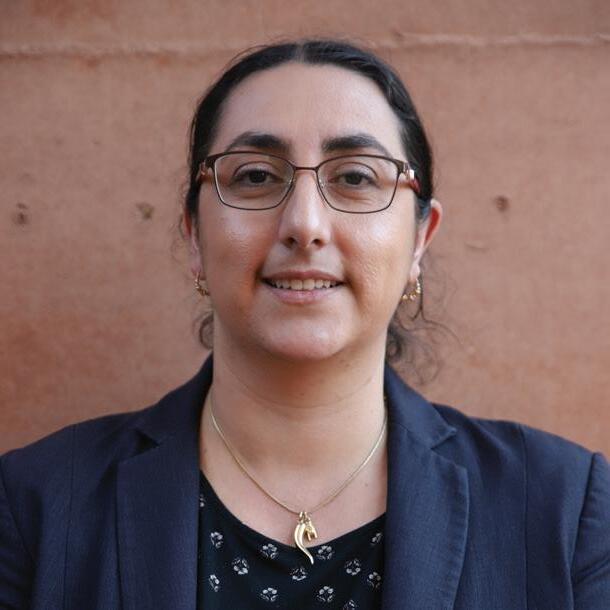
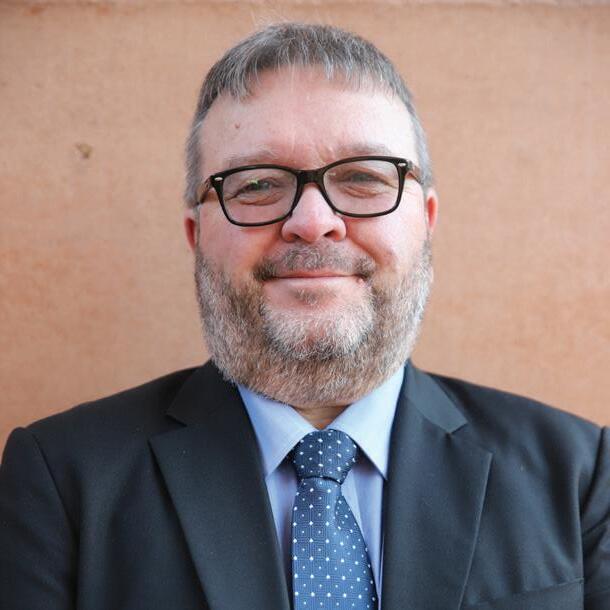




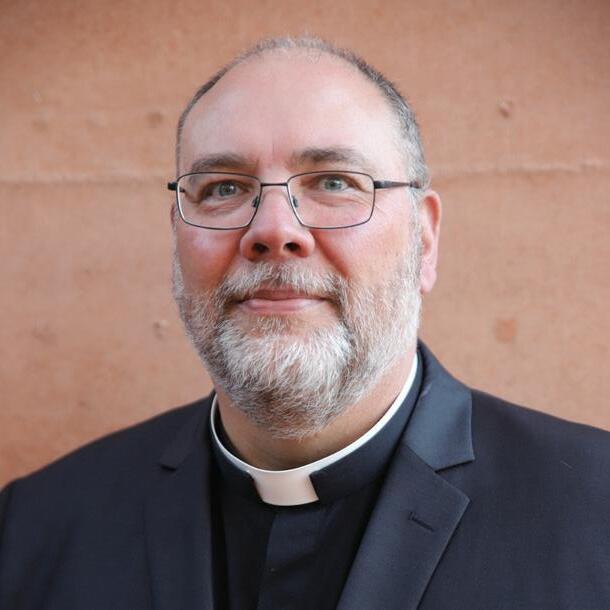
In July 2024, Bunbury Cathedral Grammar School launched its new Education and Care Service under an Approved Provider license, following a comprehensive six-month preparation process to meet national compliance requirements. Operating alongside the School’s existing education registration, the service is regulated by the Education and Care Regulatory Unit (ECRU), enabling the delivery of early learning and care programs under the Education and Care National Law. The new service - including Koolangka Learning (Long Day Care), Little Grammies, Kindergarten, Before and After School Care, and Vacation Care - was established to meet growing community demand. Within six months, it has exceeded expectations in both impact and delivery. Located within the School’s unique natural setting, the service offers children rich daily experiences and supports a strong, connected start to their education journey.
At our Early Learning service, we are committed to creating a nurturing and engaging environment where every child feels safe, supported, and inspired to learn. Our teaching approach centres on strong relationships, responsive planning, and purposeful play. This philosophy aligns with the Early Years Learning Framework (EYLF) Principles of Secure, Respectful and Reciprocal Relationships and High Expectations and Equity, reflecting our belief that all children are capable learners when given the right support.
Throughout the year, we have implemented a focus child approach inspired by the Walker Learning framework. Each week, educators observe a small number of children closely, using these insights to plan experiences that align with their interests and developmental needs. This method supports Outcome 1:
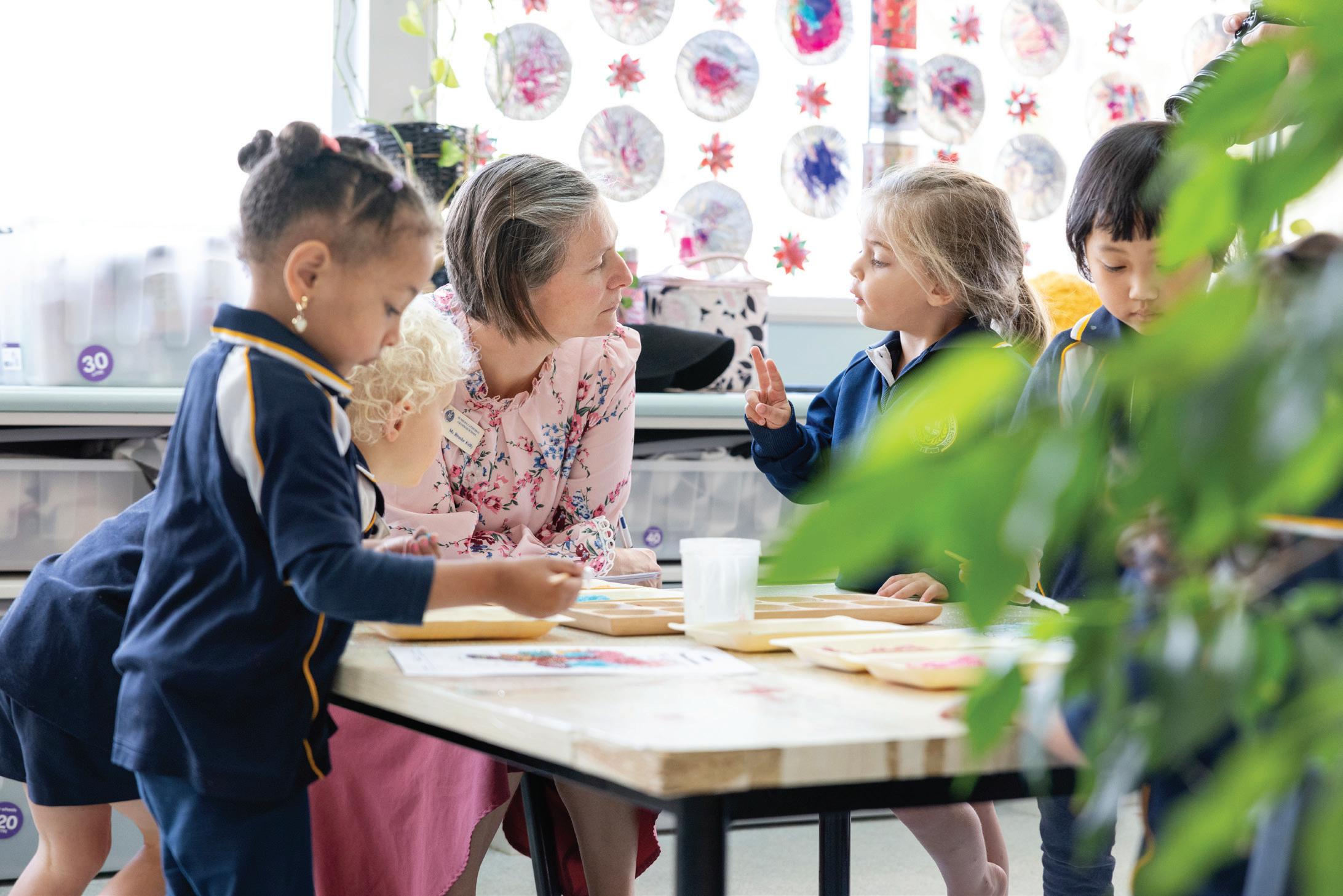
Children have a strong sense of identity, as it allows each child to feel seen, heard, and valued. It also supports the EYLF Practice of Responsiveness to Children, by ensuring that our planning reflects the voice and needs of the child.
Our play-based curriculum encourages children to explore, create, problem-solve, and discover through hands-on, open-ended learning experiences. From our babies through to kindergarten, we intentionally plan activities that support communication, social development, and curiosity. These experiences reflect Outcome 4: Children are confident and involved learners and Outcome 5: Children are effective communicators. In our Kindergarten program, we have strengthened our literacy teaching through the Talk for Writing professional development, which aligns with the EYLF focus on intentional teaching and supports children’s oral language, storytelling, and early writing skills.
Supporting children’s wellbeing is at the heart of everything we do. Educators build strong, trusting relationships with children to help them feel secure and confident. Routines are flexible and responsive to each child’s emotional and developmental needs. This aligns closely with Outcome 3: Children have a strong sense of wellbeing and the EYLF Practice of Holistic Approaches. For children who are new or unsettled, we provide personalised updates with photos to reassure families and build trust, reinforcing children’s sense of belonging and emotional safety.
Family engagement remains a key strength of our service. Using the OWNA platform, we document and share learning through daily posts, photos, and reflections linked to the EYLF learning outcomes. This consistent communication supports the Principle of Partnerships with Families and fosters Outcome 2: Children are connected with and contribute to their world by building strong home–service links. Families gain real-time insight into their child’s learning and can see the purpose behind the experiences we provide, creating a shared and meaningful journey.
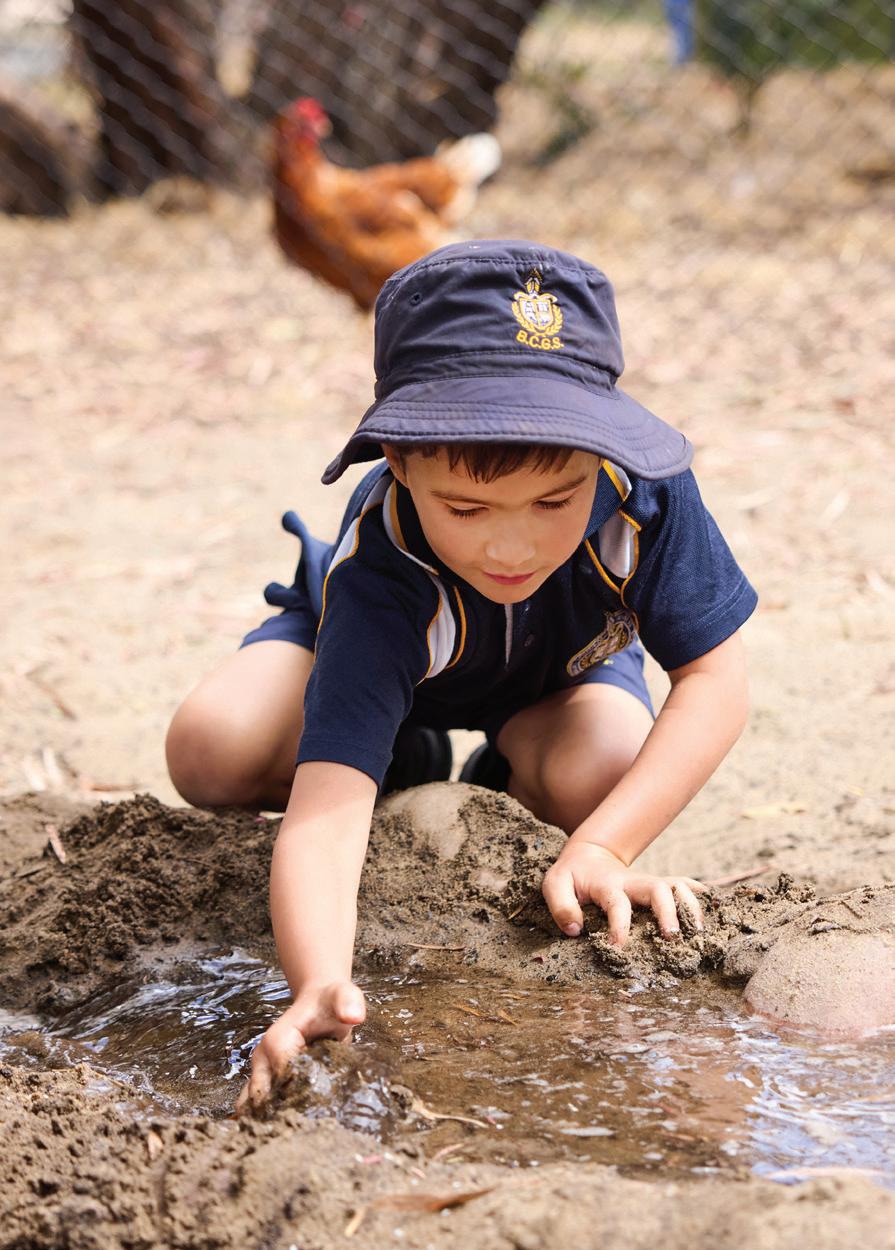
We are proud of the environment we have created — one that supports teaching, learning, and wellbeing in meaningful and consistent ways. Through responsive practices, digital documentation, and strong partnerships with families, we continue to provide high-quality care and education that supports every child to thrive. This commitment is deeply aligned with the EYLF vision for children to become confident, connected, and capable lifelong learners.
Across both Primary and Secondary, students engaged in a broad suite of enrichment programs designed to build critical thinking, collaboration, and communication skills. A key innovation this year was the introduction of dedicated Critical Thinking lessons in Years 2 to 4, strengthening early cognitive development through structured inquiry and problem-solving activities.
In the Primary School, academic challenge and extension opportunities were woven through literacy, philosophy, and STEM enrichment. Year 3 and 4 students authored and published a poetry anthology following a series of creative writing workshops with visiting author Sally Murphy. Year 5 and 6 students took part in the Make Your Own Picture Book Competition, with three students receiving top 10 state placements, and participated in the Children’s Book Council of Australia Shadow Judging Program, where they demonstrated high-level literary analysis and evaluative skills.

Philosophy Club for Years 3 to 6 and participation in the South West Junior Philosothon enabled students to explore complex ethical concepts, strengthening their reasoning and collaborative inquiry abilities. Year 6 students represented the School at the IPSHA WA Speakers’ Challenge, showcasing advanced public speaking and critical engagement.
Mathematics continued to be a strong area of opportunity, with Primary students participating in Have Sum Fun, Maths Explorer, and the Australasian Problem Solving Olympiad - developing perseverance, logical reasoning, and enthusiasm for challengebased learning.
In Secondary, students participated in Model UN, interschool debating, Da Vinci Decathlon, and the Ethics Olympiad, with our Senior team achieving a top four finish. STEM excellence was demonstrated through participation in the Science and Engineering Challenge, where students placed second in the regional round, and in the WA Country Health Services Think Tank, where School teams were awarded both regional and state titles. Students also attended Murdoch’s WISE Women in STEM event, supporting early career awareness and gender equity in science-based fields.
Language and logic skills were on show in the OzClo Linguistics Challenge, where teams received Honourable Mentions, and in the Year 7 Genius Hour program - an extension model centred on inquiry, ethical decisionmaking, and original research. Creative and expressive opportunities were equally prominent, with Secondary students participating in the What Matters? Writing Competition, and engaging with Future Problem Solving models - bridging imagination with strategy to address hypothetical global scenarios.
The cumulative effect of these programs is significant. Students across the School have had access to more than 20 unique academic co-curricular opportunities in 2024 alone, many of which led to commendable performances and external recognition at regional and state levels.
These programs are a defining feature of our educational model and a key contributor to the well-rounded, high-achieving learners we are proud to nurture.
Literacy & Language
• Poetry Anthology Project (Years 3–4, with author Sally Murphy)
• Make Your Own Picture Book Competition (Years 5–6; 3 students in WA top 10)
• CBCA Shadow Judging Program (Years 5–6)
• IPSHA WA Speakers’ Challenge (Year 6)
Critical Thinking & Philosophy
• Philosophy Club (Years 3–6)
• South West Junior Philosothon
• Critical Thinking Lessons (Years 2–4)
STEM & Mathematics
• Da Vinci Decathlon (preparation and participation)
• Have Sum Fun Maths Competition
• Australasian Problem-Solving Maths Olympiad
• Maths Explorer Competition
• South West Science and Engineering Discovery Day
Humanities, Ethics & Public Speaking
• Philosothon (Secondary division)
7–12)
• Ethics Olympiad (Senior School team placed 4th)
• What Matters? Writing Competition
• Model United Nations (team reached State Finals)
• Interschool Debating (including Country Week)
STEM & Innovation
• Da Vinci Decathlon (team participation)
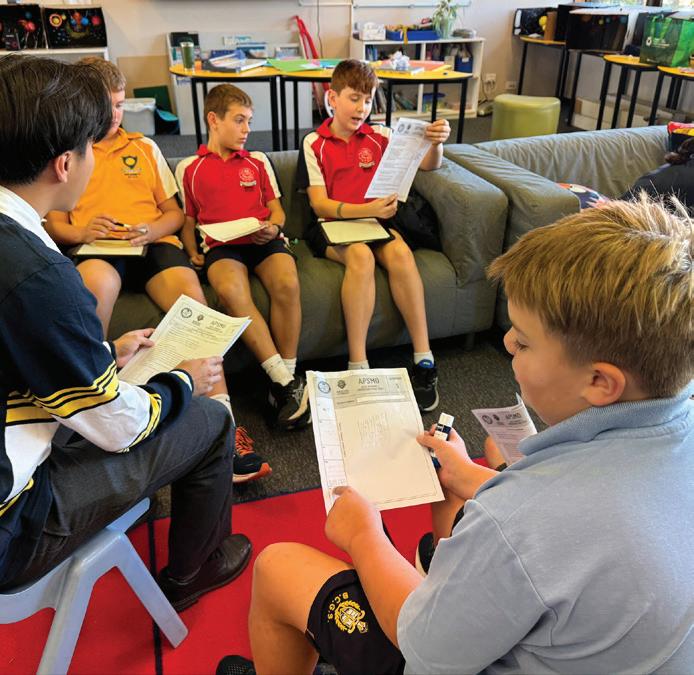
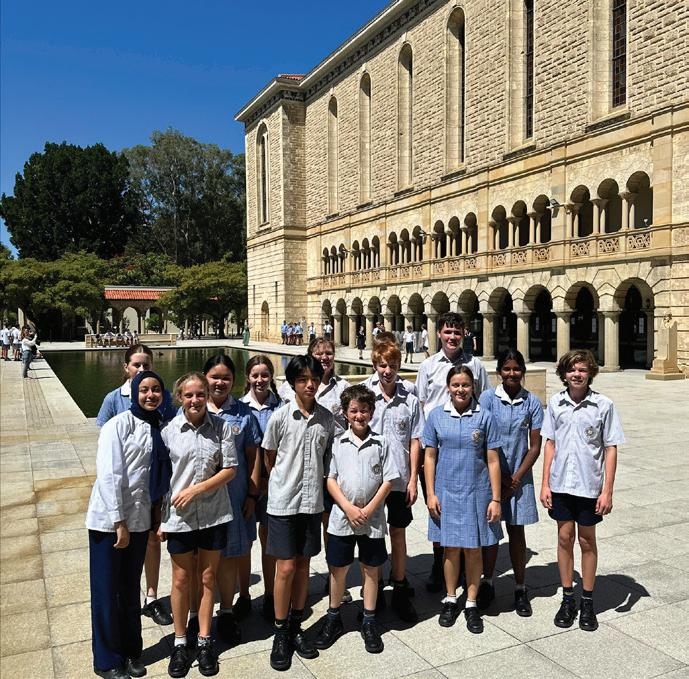
• OzClo – The Australian Computational and Linguistics Olympiad (honourable mentions)
• Science and Engineering Challenge (2nd in regional round)
• WA Country Health Services Think Tank (won regional and state rounds)
• RoboCup Competition
• Murdoch University’s WISE Women in STEM event
• Future Problem Solving (Secondary initiative)
Mathematics & Logic
• Have Sum Fun Mathematics (Secondary division)
• ICAS Mathematics Competition
• Maths Olympiad
In 2024, Bunbury Cathedral Grammar School continued to strengthen its commitment to outdoor and experiential learning as a central pillar of student development. Purposefully designed programs span Kindergarten through to Year 12, the School’s comprehensive camps curriculum supports personal growth, fosters resilience, and reinforces a culture of wellbeing and community connection.
Camps are a highlight for Primary students, creating lasting memories while reinforcing personal growth and social development. From Kindergarten through to Year 6, each camp experience is thoughtfully aligned with the School’s strategic focus on wellbeing, positive relationships, and experiential learning. As students progress through Primary School, so too does the duration, complexity, and independence required at each stage.
• Kindergarten students enjoyed a morning at the Apple Fun Park in Donnybrook, a joyful and active excursion that gently introduced them to the concept of learning outside the classroom.
• Pre-primary students ventured further afield for a full-day adventure to Perth Zoo and Kings Park - an exciting immersion into environmental learning that resulted in many happy and tired faces on the bus home.
• Year 1 and 2 students experienced their first overnight stay away from home with a camp in Margaret River. This milestone in early independence was supported by engaging activities, nurturing supervision, and a sense of shared accomplishment.
• Year 3 students participated in a two-night camp in Pemberton, exploring towering karri forests, minibeast habitats, and the iconic Yeagarup Dunes. The program also included art and environmental immersion along the Understory Art and Nature Trail.

• Year 4 students braved the winter chill at Dryandra, encountering endangered Western Australian wildlife, participating in real-life conservation practices, and preparing some of their own meals as they began to take more responsibility.
• Year 5 students travelled to Perth, engaging with cultural and historical learning through a visit to WA Museum Boola Bardip and participating in the ‘Tour de Freo’ - a navigational challenge requiring teamwork and problem-solving.
• Year 6 students culminated their Primary School journey with the option of a week-long educational tour to Canberra, including visits to Parliament House, the Australian War Memorial, and three days of skiing at Perisher - reinforcing their understanding of Civics and Citizenship while building resilience and perseverance through physical challenge. Alternative opportunities were also provided for students who remained in Western Australia.
From Years 7 to 10, the Secondary School’s comprehensive camps curriculum continues to support personal growth, foster resilience, and reinforce a culture of wellbeing and community connection. Grounded in the philosophies of challenge by choice, positive relationships, and environmental stewardship, each stage provides rich, age-appropriate experiences that build progressively over time.
The Year 7 Orientation Camp launches the Secondary journey with a focus on cultural alignment, peer connection, and interpersonal skills. Held in the first week of the academic year, it introduces students to the expectations and values of the School, emphasising relationships, positive communication, and a shared foundation of wellbeing. A notable 2024 initiative was the introduction of a second camp for Year 7 students - the Term 3 Experiential Learning Camp - offering a foundational outdoor experience designed to build campcraft, teamwork, and environmental awareness.
In Year 8, students engaged in structured adventure-based activities at Mornington Adventure Camp, developing outdoor skills such as raft building, low ropes, abseiling, and bush cooking focussed on expanding their independence and group management skills.
The Year 9 Camp marked a significant step forward, delivered in partnership with The Outdoor Education Group. Students tackled rock climbing at Wilyabrup sea cliffs, canoeing on the Blackwood River, and group camping, with increasing responsibility for planning, cooking, and decision-making - building independence and collaborative leadership.
At the highest level, the Year 10 Experiential Learning Expedition offered a ten-day journey through the Walpole-Nornalup wilderness. In collaboration with Outward Bound Australia, students navigated bush and waterways, cooked their own meals, participated in solo reflective time, and engaged in environmental rehabilitation - strengthening their connection to Country and deepening self-awareness.
Throughout all camps, students engaged meaningfully with the lands they explored, acknowledging and learning from the Traditional Custodians. Bush ethics, sustainable practices, and environmental responsibility were embedded throughout. These outdoor experiences play an essential role in Bunbury Cathedral Grammar School’s holistic approach to education. Aligned with the School’s values and strategic intent, the Experiential Learning Program ensures every student - across all stages of learning - develops confidence, character, and a deep sense of place and purpose.
Sport continues to play a central role in student life at Bunbury Cathedral Grammar School, promoting teamwork, leadership, resilience, and wellbeing. Complementing the skill development embedded in weekly Physical Education and Sport classes, the School offers a wide range of competitive sporting opportunities designed to support participation, excellence, and personal growth.
These opportunities span internal House events, community-based club teams, and external interschool representation. High performing student athletes also greatly benefit from targeted support through growth coaching and flexible timetabling, enabling them to balance performance goals with academic responsibilities.
The School’s vibrant House Sport program fosters spirit, camaraderie, and healthy competition. Students belong to one of four Houses: Wilson, Goldsmith, Redding, or Knight, each with its own traditions and sense of identity. The calendar of internal competitions culminates in major interhouse events, including the Swimming, Athletics, Cross Country Carnivals, and the iconic Lishman Lap of Valour, a School-wide relay and fundraiser.
In 2024, Goldsmith House delivered a historic sweep, winning both Primary and Secondary divisions in Swimming and Athletics, and securing victory in the Whole School Cross Country event - a clear testament to their consistency, teamwork, and spirit.
2024 was another standout year for sport at Bunbury Cathedral Grammar School, with students excelling across community competitions, interschool carnivals, and state-level representation. The School’s Grammar Hawks sporting clubs delivered strong results in local associations:
• Basketball: 23 teams competed; the Years 8/9 Girls A and B Division teams both secured premierships
• Cricket: Six teams represented the School, with the Year 10 team claiming back-to-back premierships
• Hockey: Eleven teams competed; the Year 7/8 team won their division
• Netball: 60 girls played in the Leschenault Netball Competition, with three teams reaching grand finals
• Volleyball: Continued program growth saw three teams compete locally

• Girls AFL: The Year 8/9 team proudly donned the School’s Indigenous-designed Guernsey
In Associated and Catholic Colleges (ACC) representative events:
• Swimming: The School placed 3rd in C-Grade and won the Overall Girls Shield
• Athletics: A 100-strong team finished 4th overall, claiming both the Junior Girls and Overall Girls Shields
• Cross Country: Competing against 80 schools, BCGS placed 8th overall and won the inaugural Champion School (Sub-500 students) Junior and Senior Divisions
The School also competed in a range of state-level and interschool competitions in basketball, cricket, netball, hockey, surfing, soccer, equestrian, and rowing:
• Basketball: Placed 2nd overall in ACC South West Championships
• Netball: Open and Intermediate teams progressed to the Perth rounds
• Hockey: The Boys team won the ACC Champion Schools title
A growing number of students were also selected for State and National teams across a range of disciplines, further highlighting the strength of the School’s sport program and individual commitment to excellence.
Bunbury Basketball Association Season (23 Teams)
ACC Basketball Carnival
Bunbury and Districts Junior Cricket Association Season (5 teams)
Kim Hughes Shield (First XI Cricket)
India Cricket Tour
Bunbury and Districts Hockey Association Season (11 teams)
ACC Hockey Challenge (Boys and Girls)
Ross Meadow Shield (Yr7-9)
Leschenault Netball Association Season (7 Teams)
SouthWest High Schools Cup Netball
Bunbury Volleyball Season (3 teams)
South West Football League Girls AFL Season
ACC AFL Year 10 Carnival
ACC AFL Year 7 Carnival
Interhouse Athletics Carnival (Primary and Secondary)
ACC Athletics Carnival (Secondary)
South West Primary Sports Association (SWPSA)
Athletics Carnival
Interhouse Cross Country Carnival (Whole School)
ACC Cross Country Championships
SSWA Cross Country
SWPSA Cross Country
Interhouse Swimming Carnival (Primary & Secondary)
ACC Swimming Carnival (Secondary)
SWPSA Swimming Carnival (Primary)
Schools Open Water Swimming Event (Secondary)
Swimming squad training (Primary and Secondary)
Rowing Squad Training
South West Schools Head of the River
Senior High Schools Country Week
Year 10 Winter Carnival
Year 7/8 Winter Carnival
SWSPA Winter Carnival
SSWA Schools Football (Soccer)
Championships (SW)
WA Interschool Equestrian Championships
Sunsmart Schools Surfing Championships
IPSHA Touch Rugby Carnival (Primary)
Meelup Run (Primary)
Lishman Lap of Valour (Primary and Secondary)
2024 was a year of growth, innovation, and achievement in the Creative Industries and Technologies at Bunbury Cathedral Grammar School. Students from Kindergarten to Year 12 engaged in diverse, highquality programs spanning visual arts, media, digital design, engineering, textiles, and food technologies.
The annual Art and Technology Exhibition served as the centrepiece of the year, showcasing exceptional student work across a broad range of media. Highlights included a creatively reimagined car transformed into garden furniture, a custom-built metal dune buggy shell, intricate sculptures from Primary students, and expertly iced Christmas cakes, all demonstrating the technical skill and imagination of students across disciplines.
A standout project during Discovery Week saw Year 7 to 9 students collaborate to create large-scale painted letters representing the Round Square IDEALS, each themed around one of the Noongar seasons. Designed using digital stencilling technology and inspired by local flora and fauna, the final installation combined cultural learning with design innovation and was proudly displayed at the Exhibition.
The School’s Media program achieved significant external recognition, with a senior student team awarded Best Student Film in the Cinesnaps Student Short Film Competition at the Cinefest Film Festival. Their success reinforced the School’s strength in film production and storytelling, and the program’s ability to support students in producing industry-standard work.
In Design and Digital Technologies, students made use of expanded laser engraving capabilities to produce engraved timber pieces, printed textiles, and other digitally manufactured products. Continued investment in this space includes the planned addition of sublimation printing technology and the development of a dedicated Makerspace to support further innovation and cross-curricular exploration.
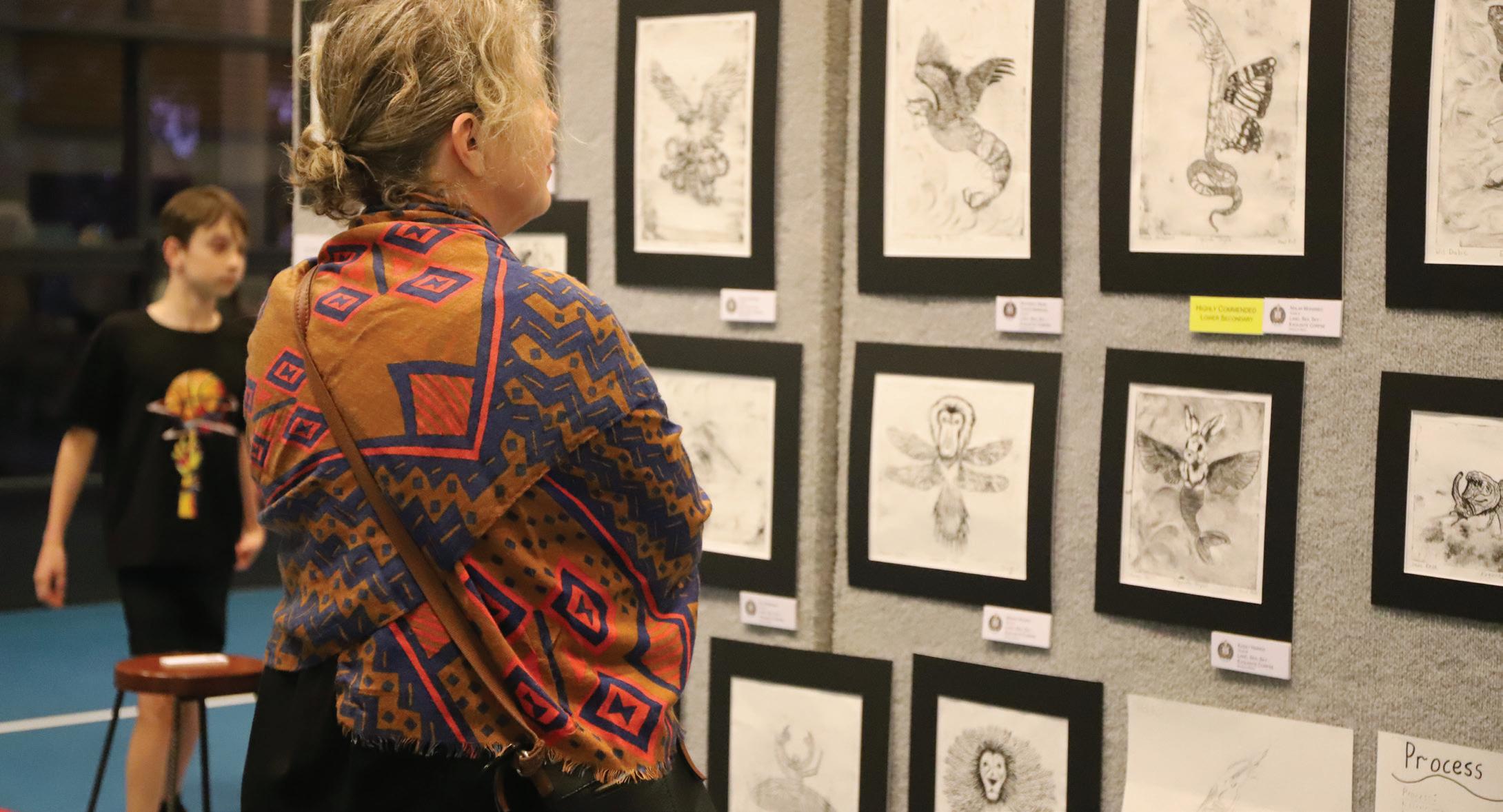
The School once again hosted the Wood Collaboration Group, involving professional artisans working onsite to co-create timber-based artworks. Students participated in the full design and construction process, contributing to works that were later auctioned in support of creative programs.
In Food and Textiles, students explored culinary traditions and food preparation skills, producing a range of high-quality dishes as part of their coursework and Exhibition contributions. Textile and garment construction remained a popular area of focus, supporting creative expression through applied technologies.
Across the faculty, learning programs integrated the use of professional-grade equipment and digital tools, aligned with curriculum outcomes. Programs emphasise creativity, critical thinking, and design-based problem solving - equipping students with transferable skills essential for future learning, enterprise, and global citizenship.
2024 began with the annual Music Camp, featuring an overnight stay on campus and an engaging schedule of rehearsals and activities.
In Term 2, the Big Band BBQ showcased outstanding performances from a range of ensembles and featured the premiere of the Year 6 Band. The Senior Concert Band Music Tour followed in June, with students travelling to the Bickley Outdoor Recreation Camp near Perth. The tour included school performances, a workshop at the University of Western Australia, and a collaboration with the Armadale City Band. A highlight of Term 3 was the Music Gala, a celebration of student achievement featuring all Primary and Secondary ensembles and choirs.
The Secondary Choir was honoured to perform In Flanders Fields at the WA War Memorial on Remembrance Day, following a personal invitation from the State President of the RSL. Their moving performance received commendation from the Premier of Western Australia.
In Performing Arts, Primary students brought energy and humour to their production of The Amazing Adventures of Superstan, taking full responsibility for backstage, technical, and front-of-house roles.

The Secondary Production of The Curious Incident of the Dog in the Night-Time captivated audiences with its heartfelt exploration of neurodiversity, resilience, and belonging. Additionally, several Senior Secondary students were selected to participate in a specialised workshop conducted by the Western Australian Academy of Performing Arts, gaining valuable insight into the performing arts industry.
Bunbury Cathedral Grammar School remains steadfast in its commitment to supporting the wellbeing and mental health of students and staff, underpinned by the principles of Positive Psychology. Grounded in Seligman’s (2002) PERMAH model, the School’s Wellbeing Framework is structured around six core pillars: Positive Emotions, Engagement, Relationships, Meaning, Accomplishment, and Health.
Throughout 2024, our Wellbeing Program has continued to evolve, with a particular focus on the implementation of a Positive Behaviour Framework. Developed collaboratively by Primary and Secondary wellbeing and administration teams, this whole-school, evidence-based approach aims to promote positive behaviour and enhance academic and social outcomes for all students. At its heart is the explicit teaching of behaviours that foster students’ learning and personal development at every stage of their education.
Behaviour is recognised as a key indicator of learning and a reflection of how students adapt to their environment. Research consistently shows that environmental factors shape behaviour, and that positive, pro-social behaviours can be explicitly taught (Sugai & Horner, 2002; Sugai et al., 2008). Our framework incorporates a continuum of behavioural supports, recognising that, like academic learning, students require differing levels of intervention to succeed.
Tier 1 – Primary Prevention
Led by Home Group Teachers and Year Co-ordinators, this tier provides universal behavioural and academic support to all students. It focuses on prevention by explicitly teaching expected behaviours and cultivating positive learning environments across all settings.
Tier 2 – Secondary Prevention
Guided by Heads of House and Deputy Heads of Primary, this tier provides targeted support for students who continue to face behavioural challenges despite Tier 1 supports. Using data-informed identification, students are offered interventions such as small group social skills programs, academic support, mentoring, self-regulation strategies, and behavioural plans.
Tier 3 – Tertiary Prevention
This tier involves the Director of Students, School Psychologist, School Counsellor, Deputy Heads of Primary, and other specialised wellbeing staff. It provides intensive, individualised interventions for students with complex needs. These supports are grounded in comprehensive behavioural assessments and often involve collaboration with families, external mental health professionals, and community services.
A new online triage system has been introduced to streamline access to specialised wellbeing support, including the School Psychologist, Counsellor, and Nurse. This system enables more effective prioritisation based on urgency and ensures timely and appropriate interventions. Parents are kept informed throughout the process, fostering a transparent and collaborative approach.
Student voice has also been a key focus. The structure of the Student Executive has been strengthened,
and a dedicated Year 11 Leadership Group was introduced. These initiatives have created meaningful opportunities for students to engage in decision-making, represent their peers, and develop leadership within a supportive framework.
House Activity Periods have been revitalised to incorporate greater input from both students and staff. This collaborative planning has resulted in a more purposeful and engaging program that reflects the diversity of student interests and promotes connection and participation.
Community Lunches have continued to embody the values of our School. These events support charitable causes, celebrate student leadership, and offer opportunities for the wider community to come together in a relaxed and inclusive environment. They reinforce student agency and promote the importance of giving back.
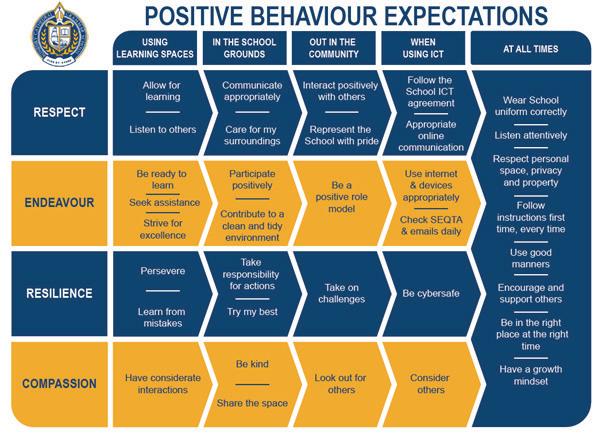
The Primary School has made significant progress in embedding a culture of positive behaviour and collective wellbeing. The Positive Behaviour Support (PBS) Matrix - developed under the leadership of Mrs Larissa Marchant and Mr Stephen Monaghan - has been central to this work. The matrix was co-constructed through meaningful consultation with students, staff, and families, ensuring it is developmentally appropriate and aligned with the School’s core values.
By articulating clear expectations, the matrix helps students understand how our values are enacted across classroom and social settings. It is prominently displayed in learning and shared spaces and is consistently referenced during assemblies, lessons, and peer interactions.
Teachers have integrated the explicit teaching of positive behaviour into classroom routines, often alongside social-emotional learning. Pedagogical strategies such as modelling, storytelling, role-play, and reflective discussions support students in internalising these behaviours. This empowers them to make values-driven choices both in learning and play.
Positive reinforcement remains a key feature. Class Dojo continues to be a vital tool for tracking and acknowledging behaviour aligned with the PBS Matrix. It enables consistent, immediate, and visible feedback, helping students connect their actions to the values of respect, responsibility, and resilience.

In addition, a new reward system incorporating in-class, House group, and whole-school incentives was trialled throughout 2024. Designed to complement Class Dojo, the system recognises both individual and collective achievements, with a focus on encouraging all students to contribute positively to the School community. The system will be fully implemented in 2025, ensuring a cohesive approach to behaviour support.
The PBS framework also engages staff in regular reflection and data analysis to refine strategies and provide timely interventions for students who require additional support. This ongoing commitment to professional learning, intentional practice, and continuous improvement ensures the program remains responsive and effective.
Together, these initiatives contribute to a safe, inclusive, and nurturing environment in which every child is known, valued, and supported.
The Duke of Edinburgh’s Award is a globally recognised youth development initiative that empowers young Australians aged 14 to 24 to explore their potential, develop real-world skills, and find their place in the world. The program offers three levels of achievement - Bronze, Silver, and Gold - each presenting increasing challenges and rewarding commitment, resilience, and leadership. Participants engage in four key areas: Physical Recreation, Skills, Voluntary Service, and an Adventurous Journey.
At Bunbury Cathedral Grammar School, the Award continues to flourish. In 2024, participation remained strong across multiple year levels, with students embracing the opportunity to extend themselves beyond the classroom.
We are particularly proud to share that Bunbury Cathedral Grammar School was ranked number five in Western Australia for Award completions, according to data from the Duke of Edinburgh’s International Award WA. This places us among the top 30 performing Award Centres and highlights the impressive completion rate our students maintain, surpassing several large metropolitan schools in the process.
This recognition reflects the dedication of our students and the commitment of our trained staff, whose mentorship and encouragement help ensure that participants stay engaged and supported throughout their journey.

Bunbury Cathedral Grammar School is pleased to present the 2024 NAPLAN results, reflecting the academic performance and progress of our students across the assessed year levels. NAPLAN continues to provide valuable diagnostic insight into student learning, informing planning and teaching practice across literacy and numeracy. Student achievement is reported across four proficiency levels: Exceeding, Strong, Developing, and Needs Additional Support.
Year 3 students demonstrated strong foundational skills, performing above the National Mean in Reading, Writing, Grammar and Punctuation, and Numeracy. Results in Spelling were slightly below Similar School Means, presenting a constructive focus area for future development. Overall, Year 3 performance was closely aligned with Similar Schools, affirming the strength of early learning programs and curriculum delivery.
Year 5 Cohort
The Year 5 cohort achieved results exceeding the National Mean in all areas. When compared to Similar Schools, they performed at or above in Reading and Grammar and Punctuation, while showing marginally lower outcomes in Writing, Spelling, and Numeracy. These insights will inform targeted strategies for continual improvement, while the cohort’s progress from Year 3 highlights strong student growth and engagement.
Year 7 Cohort
The Year 7 results for 2024 were particularly strong, with students performing above the National Mean across all categories. Compared with Similar Schools, the School achieved higher outcomes in every area. Both continuing students and new entrants to the Secondary School demonstrated positive academic progress and high engagement.
Year 9 students achieved above both State and National Means across all assessment domains. Performance in Numeracy was especially strong, with continued academic growth evident in Reading, Writing, and Grammar. While Spelling was slightly below Similar Schools, targeted strategies will be implemented in 2025 to further support this area. The data reflects a cohort demonstrating sustained development and academic maturity.
Bunbury Cathedral Grammar School values the data provided by the NAPLAN assessments. This information informs curriculum refinement, identifies learning trends, and shapes ongoing teaching and learning strategies. Initiatives such as targeted literacy programs, differentiated instruction, and the use of diagnostic tools such as Elastik continue to support the School’s commitment to continuous improvement in student outcomes and educational excellence.
The Online Literacy and Numeracy Assessment (OLNA) is conducted across multiple testing windows annually for Secondary students in Years 10, 11, and 12 who have not yet met the minimum standard through NAPLAN. This assessment ensures students meet the requirements necessary to achieve the Western Australian Certificate of Education (WACE). Students are provided with up to six opportunities across their secondary schooling to achieve the standard in Reading, Writing, and Numeracy.






The Class of 2024 has continued Bunbury Cathedral Grammar School’s tradition of academic excellence, with outstanding results that reflect the strength of our learning community and the School’s commitment to student success.
In 2024, 75.4% of our Year 12 students pursued an ATAR pathway - one of the highest participation rates in the region. This high level of engagement demonstrates our belief in empowering every student to follow their chosen path. Leading the cohort was Cooper Reynolds, who achieved an exceptional ATAR of 99.45, placing him among the top students in Western Australia and earning him the title of Dux of the School.
The overall academic achievements of the Class of 2024 were equally impressive:
• 22.4% of ATAR students achieved an ATAR above 95, placing them in the top 5% statewide. These exceptional students join an elite group of Grammarians, inducted as Distinguished Scholars.
• 34.7% achieved an ATAR above 90, ranking them in the top 10%.
• 75.5% achieved an ATAR above 70, placing them within the top 30% of the state.
Importantly, 100% of the 54 students in the Class of 2024 graduated, with all students attaining a Western Australian Certificate of Education (WACE) or equivalent qualification through Vocational Education and Training (VET). Demonstrating a hallmark of our School and a rare achievement in the region.
These results reflect not only the resilience and ambition of our Year 12 students but also the dedication of their teachers and the support of their families. The Class of 2024 leaves behind a powerful legacy of academic excellence and personal growth, inspiring our younger students to strive for their own version of success.
In 2024, students at Bunbury Cathedral Grammar School continued to engage meaningfully in Vocational Education and Training (VET) pathways, gaining valuable skills and nationally recognised qualifications alongside their secondary studies. Across Years 11 and 12, students successfully achieved a total of 29 certificates in a diverse range of industry areas.
Certificates Achieved
Certificate II – 13
Certificate III – 11
Certificate IV – 5
These achievements reflect the School’s commitment to providing flexible and relevant learning opportunities that support a variety of post-school pathways, including direct entry into the workforce, apprenticeships, and further tertiary study.
Courses Completed in 2024
Certificate II in Sport and Recreation
Certificate II in Building and Construction (Pathway – Trades)
Certificate II in Retail Services
Certificate II in Automotive Vocational Preparation
Certificate II in Engineering Pathways
Certificate II in Medical Service First Response
Certificate II in Automotive Servicing Technology (Light Vehicle Servicing Pre-Apprenticeship)
Certificate III in Business
Certificate III in Animal Care Services
Certificate III in Health Services Assistance
Certificate III in School-Based Education Support
Certificate III in Fitness
Certificate III in Aviation (Remote Pilot)
Certificate III in Community Services
Certificate IV in Preparation for Health and Nursing Studies
Certificate IV in School-Based Education Support
Certificate IV in Tertiary Preparation (Sports and Nutrition)
Pre-Apprenticeship Cookery (Commercial Cookery)
Each year, the School surveys our graduating cohort to gather reflections on their time at Bunbury Cathedral Grammar School and their plans for the future. These insights continue to inform how we support students on their post-school journey.
From the 2024 respondents:
• 89% of ATAR students received an offer to their first university preference
• A further 13.5% entered university via an alternative pathway
• 35% of students indicated they would be taking a gap year in 2025, with plans to defer or enrol the following year
• 94% of students intend to be employed in 2025, with 30% working full time
Many graduates are headed for university study at institutions such as UWA, Curtin, and Murdoch University, pursuing diverse degrees from Biomedical Science and Commerce, to Sport and Exercise Science and Law. Others are diving into vocational pathways - one student has begun a Machinist Apprenticeship at D&R Machining, while another is studying a Certificate III in Education Support at Bunbury TAFE.
Our students leave with purpose and a clear sense of direction. Some are heading into degrees that will lead them to careers in law, medicine or business. Others are gaining hands-on skills through apprenticeships or training, or taking a year to work, travel or reflect. No matter the path, what stands out is their confidence, motivation and willingness to shape their own future - qualities that speak to the heart of a Grammar education.

Our modern, refurbished, cottage-style boarding units continue to provide a warm and inviting atmosphere within our scenic school grounds, nurturing lifelong friendships and personal growth. With accommodations for up to seven students of the same gender, our Boarding community offers shared amenities for younger students and private rooms for older students, promoting comfort and personalised space.
As one of only three co-educational boarding schools in Western Australia, Bunbury Cathedral Grammar School remains committed to delivering a cohesive, nurturing educational experience. Our Boarding options cater to a variety of needs, including:
Full-Time Boarding
Short-Term Boarding
FIFO Boarding
Overnight Boarding: Stopovers and Sleepovers
International Student Boarding
2024 Highlights
This year, our Boarding community has seen meaningful progress and new partnerships that enhance the experience for all students:
Program Development
The Big Brother Big Sister program has been consolidated, strengthening bonds and mentorship among boarders. This initiative continues to foster positive relationships and support personal development.
International Boarding Growth
We have expanded our enrolments and engagement in the international student space, welcoming diverse new students and supporting short-term visits that enrich cultural exchange.

Our embedded partnership with the Global Islamic Boarding School (GIBS) has deepened, providing enhanced opportunities for collaboration and cultural understanding within our boarding community.
To better suit Boarders’ busy co-curricular schedules, medication routines, and to encourage attendance at tutorial sessions, flexible Prep arrangements have been introduced. This flexibility supports students in balancing their academic and personal commitments more effectively.
The Boarding Student Executive has played a vital role in representing boarder perspectives and contributing to community initiatives. We extend our sincere thanks to David Nelson-Palmer (Head Boarder) and Chelsea Roddy (Deputy Head Boarder) for their leadership and dedication in amplifying the student voice.
Bunbury Cathedral Grammar School continues to expand its global outlook through strategic partnerships, international enrolments, and active participation in the Round Square network. These initiatives enrich student learning by fostering cultural understanding, personal development, and global leadership.
In 2024, the School further strengthened its international presence with enrolments from Sierra Leone, Hong Kong, and Indonesia, alongside four short-term placements from Brazil through a successful government exchange program. These students have brought valuable cultural perspectives to the School community, particularly within the Boarding environment.
The School proudly hosted an Indian Round Square Cricket Tour, combining competitive sport with cultural exchange. This initiative led to a student exchange with Daly College, India, during which two students joined the Boarding community for four weeks. Supporting broader international collaboration, the School also welcomed a delegation of Indian principals and school owners as part of a Western Australian study tour. The program explored differences between public and private education across regional and metropolitan contexts and concluded with an immersive visit to Bunbury Cathedral Grammar School.
In May, the International Enrolments Coordinator and the Principal and CEO travelled to Indonesia to deepen relationships with key partner schools. The visit included engagement with the Global Islamic Boarding School (GIBS), previously hosted by the School, and laid the groundwork for ongoing collaboration and future student immersion and exchange programs.
Bunbury Cathedral Grammar School was also prominently represented at the 18th ANPS International Leadership Conference in Kuala Lumpur, where the Principal and CEO was invited to deliver a keynote address. The presentation, “Transforming Educational Leadership: Integrating Digital Tools, Pedagogical Innovation, and Learning Spaces for Sustainable Change”, highlighted the School’s research-based approach to leadership and curriculum development. The address was well received and affirmed the School’s reputation as a progressive and globally connected institution.
As an active member of Round Square, the School continues to offer students transformative international experiences within the Round Square network. In 2024, the Round Square Representative and International Enrolments
Coordinator, and the Principal and CEO attended the annual Round Square Australasia and East Asia Forum, hosted by Christs College, New Zealand. This event brought together Round Square representatives from across regions to undertake structured professional development, best practice workshops, and valuable networking. The forum laid the groundwork for future collaboration and potential student exchange programs across the region.
The exchange program offers students across the year levels opportunities to embark on their journey of becoming a global citizen. Year 6 students took part in a unique exchange program with Radford College, Canberra. Year 8 students participated in the national exchange program with student exchanges to Bishop Druitt College in Coffs Harbour, Radford College in Canberra, and Scotch Oakburn College in Tasmania. Year 9 students exchanged with Christs College in New Zealand, and Year 10 students participated in exchanges at:
• Rothesay Netherwood School, New Brunswick, Canada
• Le Salésien, Quebec, Canada
• Bridge House School, South Africa
• Louisenlund School and Landheim Ammersee, Germany
• Abbotsholme School, United Kingdom
In addition, four students attended the 56th Round Square International Conference, held in Bogotá, Colombia, with a pre-conference tour in Madrid, Spain. Centred on the theme “Blooming from the Past”, the event united student delegates from around the world to explore cultural heritage, reflect on history, and collaboratively shape a more sustainable global future.
Looking ahead to 2025, the School anticipates welcoming eight international students and expanding its capacity for short-term immersion programs. This approach reflects Bunbury Cathedral Grammar School’s commitment to global engagement and to the values upheld by the Round Square IDEALS.
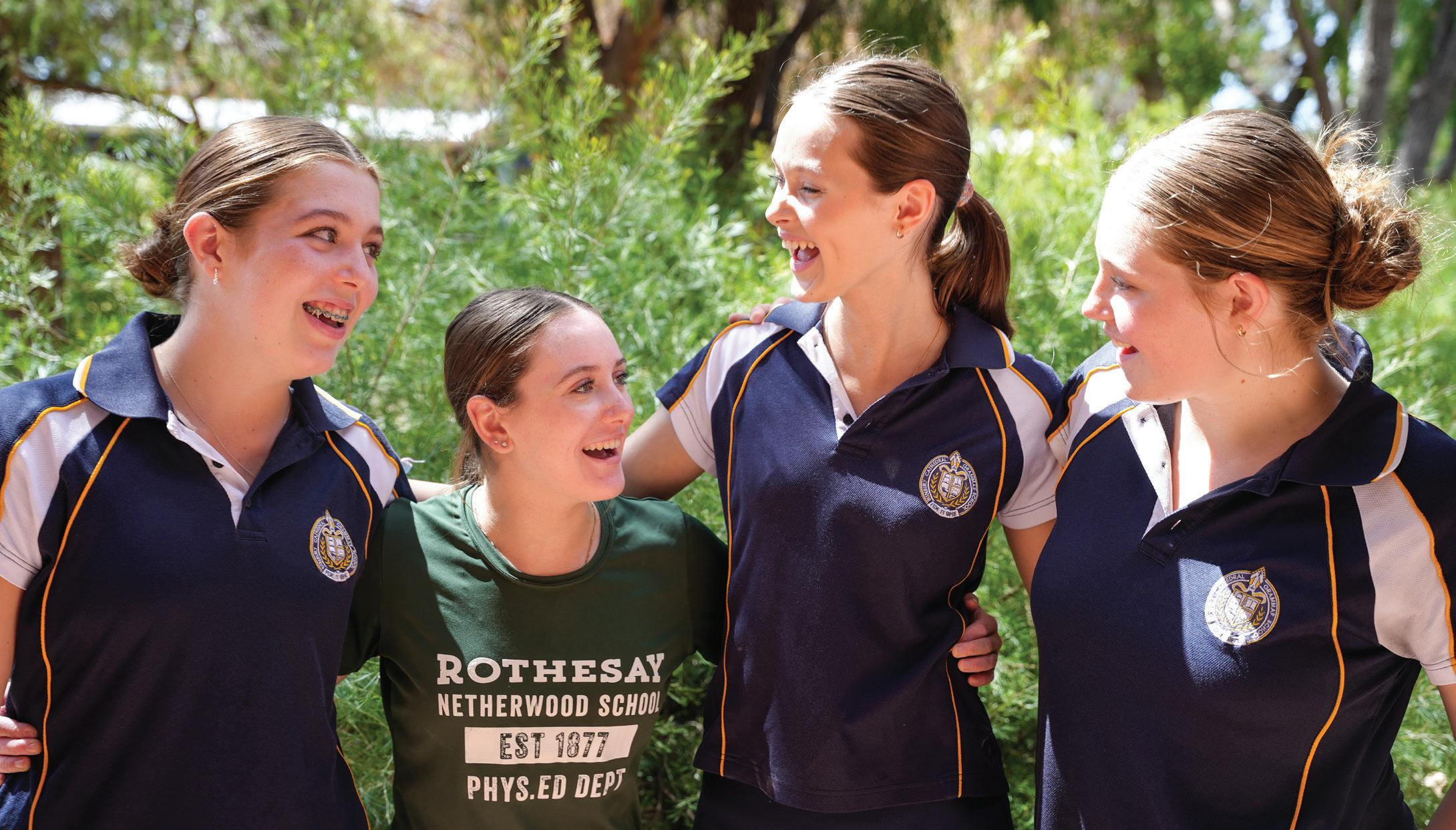
This year has been one of continued growth and development for Bunbury Cathedral Grammar School, with enrolments increasing steadily across both Primary and Secondary year levels. In 2024, strong numbers in Year 7, Year 9 and Year 10 have continued to support multi-stream classes, while the School also maintained strong enrolments across the younger Primary years.
Looking ahead to 2025, the School anticipates commencing the academic year with more than 700 students - a significant milestone that reflects increasing community confidence in the quality, care, and direction of our educational offering. Our Early Learning programs continue to attract strong interest, with Kindergarten operating near full capacity across two classes, and Pre-Primary already maintaining a waitlist. To accommodate this sustained growth, the School is progressing with a planned program of expansion

and facilities enhancement. This includes the construction of a minimum of three new Primary classrooms to support the transition to two classes per year level from Pre-Primary to Year 6. In addition, two purpose-designed precincts - one for Pre-Primary and Year 1, and another for Years 2 to 4 - will provide students with dedicated learning environments that integrate structured instruction with engaging outdoor play
In support of operational efficiency and the enrolment experience, the School has also implemented Enrol HQ, a new digital platform designed to streamline administration processes. This system enhances accessibility and responsiveness for prospective and current families, reinforcing our commitment to strong family partnerships and future-focused service delivery.
Student attendance remains a key focus at Bunbury Cathedral Grammar School, with overall attendance across all year levels recorded at 91% in 2024. The attendance rate for Aboriginal and Torres Strait Islander students was 87%, with these students comprising approximately 3% of the overall student population.
In 2024, 66% of all students attended more than 90% of the school year, reflecting continued efforts to promote regular and engaged participation in School life.
The School maintains a proactive and supportive approach to attendance. Attendance is monitored closely by Home Group teachers and Heads of House, who work collaboratively with the Wellbeing Team to identify and respond to emerging concerns. This includes regular reviews of attendance patterns, early contact with families, and the implementation of individual support plans where required.
Student attendance is recorded electronically on a period-by-period basis through SEQTA, the School’s learning and administration platform. The Student Services team reconciles absences against parent notifications daily and follows up promptly on unexplained absences. This ensures timely communication with families and supports a consistent and well-informed approach to attendance management.
The School’s attendance data is reported in accordance with national requirements and published via the My School website, contributing to system-wide transparency and accountability.
My School Portal
In 2024, Bunbury Cathedral Grammar School continued to deliver on its three strategic themes, shaping the way for priorities, objectives and proactive responsiveness to ensure continual quality improvement across the School:
• Excellence in all that we do - a growth mindset underpinned by effort
• A community based on positive relationships - Building, Defining and Strengthening School Culture
• Reimagining the School’s profile and identity - honouring the past and shaping the next 50 years (2022 marked our 50th Anniversary)
Excellence in all that we do A growth mindset underpinned by effort
A community based on positive relationships Building, defining and strengthening School culture
Reimagining the School’s profile & identity Honouring the past and shaping the next 50 years
Guided by the theme “A Community Based on Positive Relationships – Building, Defining and Strengthening School Culture”, the School focused on embedding culture, deepening community partnerships, and strengthening student engagement.
Listening to our Community
A key focus in 2024 was listening to staff, students, parents and the wider community. Insights from the Biennial School Survey and a targeted Communication Survey are shaping communication improvements, including a new School website and enhanced engagement pathways.
Positive Behaviour Support
New approaches were developed and trialled across Primary and Secondary to support student wellbeing and behaviour. Implementation is scheduled for 2025, aligned with the Australian Student Wellbeing Framework and National Principles for Child Safe Organisations.
People and Culture
A Consultative Committee was formed to enhance staff voice and representation. Benchmarking was undertaken to recognise staff contributions and support professional growth and retention.
Reconciliation Action Plan (RAP)
Consultation with Aboriginal community members informed the review of our RAP. The School remains on track to release the new RAP to the community by Semester 2, 2025.
Building and Infrastructure
In line with the School Master Plan, 2024 saw significant progress in planning to support our growing student population. Planning also identified the need for revitalisation of shared spaces such as the Auditorium and Gym.
Following the establishment of strategic committees in 2023, 2024 focused on implementing the identified initiatives.
Curriculum and Learning
Work continued on redeveloping Years 5 to 8 curriculum and teaching programs. In partnership with Shaping Minds, staff engaged in professional learning to embed evidence-based instructional practice and support curriculum alignment and innovation.
Experiential Learning and Outdoor Education
A revised whole-school program was launched, including a new Year 7 camp and expanded Discovery Week for Years 7 to 9.
A new community sport model was introduced to provide flexibility, increase participation, and maintain elite sporting pathways. 2025 will see this embedded through new partnerships with local and state sporting organisations.
A formal partnership with the University of Western Australia supported the continued development of the School’s Agribusiness Program. A former student will lead the project, supported by a comprehensive feasibility study ensuring safe and effective land use for student learning experiences.
Timetable Innovation
A revised daily timetable of four 80-minute lessons was implemented to enable deeper learning and improved transitions. Further refinements will be introduced in 2025 to enhance student engagement and effective lesson design.
Early childhood learning environments were enhanced with the introduction of Koolangka Learning and expanded offerings. The Quality Improvement Plan was updated in line with national standards and is further detailed in the Education and Care section of this report.
In 2025, the School’s strategic priority is “Educating the Individual - Reimagining Education through DataInformed Teaching”. This work will be guided by the theme “Reimagining the Future - Honouring the Past”, bringing together tradition and innovation. The focus will be on embedding evidence-informed practices, consolidating key initiatives, and continuing to shape a dynamic and future-focused educational experience for every student.

In 2024, Bunbury Cathedral Grammar School conducted its scheduled Biennial School Results Survey (SRS) and an additional Communication Survey. These tools provided valuable insights into the experiences, perceptions, and expectations of our parents, students, and staff. The feedback gathered directly supports our commitment to continuous improvement, celebrates areas of strength, and informs strategic initiatives for 2025.
Delivered in partnership with independent provider MYP Corporation, the 2024 Biennial Survey provided our School community with a valuable opportunity to share structured feedback on key areas of School performance. Conducted between 15 and 30 August 2024, the survey was distributed to 906 eligible parents and received 406 responses, representing a 44.8% response rate. While multiple responses from the same family were possible, the School has approximately 477 families, indicating that the feedback likely represents a broad cross-section of the parent community. In addition, a student response rate of 71.8% was recorded, and 103 staff members participated in the survey. The insights gathered have played a central role in shaping ongoing strategic priorities across all areas of the School.
The overall parent satisfaction score was: 78%
Parents provided ratings across 16 key satisfaction domains using a four-point scale:
Scale
4-5 An excellent outcome that indicates a real commitment on behalf of the organisation 3-4 A fair to good score that reflects a level of satisfaction on this issue.
2-3 A poor result that suggests a core level of underlying dissatisfaction on this issue.
1-2 There are significant issues for concern and Immediate action is required
Key
Four areas received scores in the ‘Excellent’ range. 12 areas scored between 3 to 4 (Good) with eight of those responses ranging from 3.8 to 3.97. No areas were flagged as needing urgent or significant improvement.
In comparison to the 2022 parent Bi-annual Survey, nine areas showed a 4 to 5% increase in satisfaction while seven areas recorded a 0 to 5% decline in satisfaction.
Qualitative feedback from parents strongly aligned with quantitative data, reinforcing identified strengths and priorities for improvement.


A student satisfaction rating of 75% reflected a generally positive experience across the School. The following areas stood out:
Supportive Teachers: Described as approachable, encouraging, and committed Co-curricular Opportunities: Enabled students to explore passions and build confidence Values and Culture: Students reported a strong sense of connection and belonging
Areas flagged for improvement included homework load and timetable management - both of which received overall positive feedback but were noted as key priorities for review.
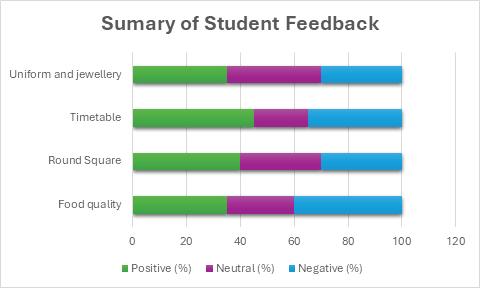
Feedback from teaching and non-teaching staff highlighted high engagement with the following themes:
Timetable Structure: Alignment across Primary and Secondary Professional Development: Opportunities were appreciated and seen as valuable Staff Support and Morale: Positive perceptions of wellbeing and collegiality Staff feedback has been incorporated into broader action planning for 2025. The School’s People and Culture team and the Consultative Committee continue to lead initiatives in staff engagement, wellbeing, and retention.

A standalone Communication Survey was conducted to better understand how families engage with School information and where clarity and responsiveness could be improved. 174 responses were received from 458 eligible families (38% response rate)

Survey results have directly shaped new and ongoing improvements, including:
• Timetable Refinement – Longer Secondary lunch breaks to align with Primary
• Digital Study Diary Implementation – A SEQTA-based digital diary for Secondary; Primary retains a physical diary
• Café Menu Review – Student-led suggestions reshaping offerings for nutrition and appeal
• Facilities Planning – Redevelopment planning for Performing Arts and Sports Precinct
• Communication Enhancements – Improvements in email formatting, SEQTA notifications, event timeliness, and a website upgrade
The School is deeply grateful to all parents, students, and staff who participated in these surveys. Their insights ensure we remain responsive to our community’s evolving needs. By combining data-driven analysis with open-ended feedback, we reinforce our shared values and our commitment to excellence, engagement, and improvement in every area of school life.

In 2024, Bunbury Cathedral Grammar School continued to build a thriving and inclusive workplace culture grounded in professionalism, wellbeing, and collaborative leadership. Across the year, the School employed a total of 192 staff members, comprising 99 teaching staff, 17 boarding staff, and 82 support staff. Our workforce remains diverse and committed, with a gender composition of 36.4% male and 63.6% female across teaching staff, and similar balances across boarding and support areas. Two Aboriginal and Torres Strait Islander staff members were also employed during the reporting period.

This year, the School implemented several key initiatives to support employee wellbeing and promote a respectful workplace culture. In alignment with the Right to Disconnect legislation, Bunbury Cathedral Grammar School proactively embedded policies to safeguard staff time outside of core working hours. This includes a formal Wellbeing Clause and the continuation of Wellbeing Days each term, offering students and staff a structured pause for rest and recharge.
Staff email signatures now feature a community message reinforcing the importance of work-life balance, and we thank our families for their ongoing co-operation in respecting communication boundaries. This initiative reflects the School’s core value of mutual respect and ensures staff can respond thoughtfully and professionally during work hours.
In 2024, the School established the Consultative Committee, a forum for collaboration between staff and leadership on workplace matters. This initiative has enhanced transparency and shared decision-making, promoting fair work practices and positive engagement. Additionally, Bunbury Cathedral Grammar School remains committed to gender equity in governance, with one female Chair and three women among the ten-member Board of Governors.
Professional development remains a cornerstone of our staff development strategy. In 2024, staff participated in 155 professional learning sessions, covering a wide range of educational, regulatory, and wellbeing topics. Key areas of focus included:
• Inclusive Education and NCCD Compliance (AISWA, Karen West)
• Positive Behaviour Support and Student Mental Health (Berry Street, ABSA)
• Curriculum Implementation and Review (ETAWA, MAWA, ACHPER)
• Governance and School Employment Law
• Data-informed Practice (Elastik)
• First Aid and Duty of Care Training
• VET, Career Pathways and Gifted Education
• ICT and Innovation in the Classroom
The School provides five structured Professional Development Days annually, including Week 0 and one per term. These days offer targeted learning, planning time, and compliance training for all teaching and education support staff. In 2024, sessions focused on updates to the NCCD framework, and strategies to better support students with additional needs.
Through this sustained investment in professional growth and workplace wellbeing, Bunbury Cathedral Grammar School continues to empower its staff to deliver exceptional education in a safe, inclusive, and future-focused environment.


Board
HEAD OF SCHOOL
Mr M R O’Brien, BSc (Hons), BEd, 2016
VISITOR
Rev’d Dr Ian Coutts
CHAIR
Mrs M Cavallo, BBus, CA
IMMEDIATE PAST CHAIR
Mr S Jacob, LLB (2000 - 2023)
VICE CHAIR
Mr M Basham, Barts
SECRETARY
Mr Y Bolto
HONORARY LIFE MEMBERS
Mrs I Bourne
Mr E C Clarke
Mr N Clifton, FRAIA
Mr W E Davis
Mrs A Dungey
Mr S Jacob
Mrs J Lishman
Mr P Manolas, BBus, CPA, MTax
Mrs J Norton
The Reverend B C Newing, ThL
MEMBERS
Mr R Bell
Mrs K Chiera
Mr R Cooper BCom, CPA
Canon D Cotton, Bth
Ms A Howie,
Mr A Kirke,
Mrs R Lanagan, BSc
Mr C Pettit, BEd, DipTeach, GradDip Management
TEACHING STAFF
(with qualifications and year of commencement)
Head of School
Mr M R O’Brien, BSc (Hons), BEd, 2016
Head of Secondary
Mrs K E Chiera, BSc (Hons), MEd, PGCE, (S2) 1999
Director of Students - Secondary
Mr K W Green, BAppSc, DipEd, 2005
Director of Studies – Secondary
Mr D White, BBus, GradDipEd, 2012
Director of Co-Curricular & High Performance Sport
Mr A G Lincoln, BPsych, MPsych, DipEd, MAPS, 2007
Head of Primary
Mr R Whirledge, BA, MA, DipEd, 2017
Deputy Head - Primary
Mrs L Marchant BA, GradCertEd (Early Childhood), 2022
Mr S Monaghan, BA(Hons), PostGradCertEd, MEd, 2024
Visiting Chaplain
The Revd Canon D Cotton
Teaching Staff
Mr J Bancroft, BA (Theatre&Drama), GradDipEd, 2008
Mrs S Bancroft, BEd (EarlyChldSt), 2015
Mrs A Barker, BSc, GradDipEd, 2024
Mr B Beatty, BBus, GradDipEd, Cert IV Training and Assessment, 2024
Mr R Brooksbank, BA, BSc, DipEd, 2005
Mr M Butler, BA, GradDipEd, 2015
Mr M Cabala, BEd, 2021
Mrs C Carlisle, HD Ed, 2011
Mrs K Claassen, MSc, GradDipEd, 2018
Mrs J Commisso, BEd, 2021
Mrs R Cook, BEd, 2021
Mrs C Cowan, BSc, GradDipEd, Med, Cert IV Outdoor Red, Cert IV Training and Assessment, 2024
Mrs K Cusack, BEd, 2020
Mr I A Dale, BPE, DipEd, 1991
Mr R D Dawson, BHPE, DipEd, 2006
Mrs L Delich, BSc (Psych), GradDipEd, 2024
Ms C Dennison, BArts, PostGradCertEd, 2023
Ms J Diedrichs, BHlthSc, PGCertPH, GradDipT, 2022
Mr L Duffield, Barts, GradDipEnvSc, Vert IV Work Health and Safety, Cert IV Training and Assessment, GradDipEd, 2024
Mr G Dunbar, DipT, BEd, 2002
Mrs L Fahie, BA, DipEd, MEd (Leadership & Management) Cert IV Training & Assessment, 2000
Miss N Ferrier, BHPE, 2021
Mr J Forbes, BSc, GradDipEd, GradCertEd (Leadership & Management), MEd, 2020
Mrs M Ford, 2023
Mrs A Geerlings, BSc, MTeach, 2024
Mr P Good, BEd, 2006
Mr L Goss, BEd, 2024
Mr J Grace, BEd, 2024
Miss T Green, BA (Humanities), GradDip Ed, 2012
Mrs K Grigg, BEd, 2022
Miss S Hartley, BEd, 2023
Ms S Hindley, MA (Eng) PGCE (Eng/Drama/Media), 2011
Mrs K Holdman, BSc (Physiotherapy), MEdL, CertMHealth, GradDipEd, 2012
Mrs R Holmes, BEd (Hons), 2010
Miss L Howell, BEd, 2022
Mrs T Howell, BA, DipEd, 2009
Mr D Jacques, MEng, PostGradCertEd, 2024
Miss E Keogh, BArts, MTeach, 2024
Ms A Leighton, 2023
Ms F Levy, 2023
Mrs J Lincoln, BTeach, MEd, 2018, 2020
Mrs J Lockhart, DipT, Cert IV (T&A) 2008
Mr A Loh, Barts, PostGradDipEd, 2024
Ms L MacDonald, BArts, DipEd, 2024
Mr D Magner, BArts, PostGradDip, 2024
Mr S Mahendran, BPharm, MPharm, GradDipEd, 2024
Ms S Maiden, BA(Hons), GradDip, GradDipEd, 2016, 2024
Mrs S Marangon, BSc, MTeach, 2024
Mrs T Maree, BA (Hons) HDE, 2011
Mrs T Marshall, BEd, 2020
Mrs M McCarthy, BEd (Prim), 2011
Mr K Murray, HDE, 2014
Mrs T Ngo, BPrimEd, 2023
Ms C Oberg, Barts, BCommunications, GradDipEd, 2024
Mr R O’Hagan, BComm, GradCert, GradDipEd, 2023
Mr D Phillips, DipTeach, BEd, CertIV Training and Assessment, 2024
Ms J Pocock, BEd, DipT, 2006
Mr J Poller, BEng (Hons), PGCE, 2008
Mr J Potter, BA, BEd, 2007
Mr J Reid, BA, BEd, 2004
Miss M Reinders, BSc (Hons), GradDipEd, 2015
Mrs H Scholtz, BSc(Hons), PostGradMkting, GradDipEd, 2017, 2024
Mrs A Sissoev, BEd, GradCertEd, 2024
Mrs J A Smith, BA, DipEd, TC, 2000
Mrs N Smith, BA, GradDipEd, MEd 2003 - 2004, 2015
Mr S Spottiswood, BA (AsianStudies), MA (InternationalStudies), DipEd, 2008
Mr M Stapleton, BComm, DipEd, MEd, 2000-2019, 2024
Mr G Strindberg, BA (Comm), DipEd, 2011
Mrs C Swart, LibIS (BBIBL), GradDipEd (Prim), 2012
Ms A Thompson, Barts, Bed, GradCert, 2024
Mr W Tomlinson BSc, PGCE, 2022
Miss D Trott, BEd, 2024
Mrs N Van Rhyn, BA (Art), GradDipEd, 2011
Mrs D Wansborough, BA (Hons), MA, PGCE, (S2) 2017
Ms M Williams, Bed, 2024
Dr R Williams, BVetSc, MTeach, 2021
Mrs R Wilson, BA (PrimEd), BEd, 2012
School Psychologist
Ms I Kerruish, BArts, GradDip, 2023
School Social Worker
Mrs M Butler, BSocialWork, DipCouns, 2024
Peripatetic Music Teachers
Ms Y Carlson, BMusEd, LTCL, 2008
Mr M Cabala, BEd, 2021
Mrs S Coffey, 2024
Ms S Collins, MTeach, LMusA, AMusA, 2021
Mr N Davies, DipTeach, BEd, 1996
Mrs T Kavanagh, BSc, 2014
Mr G Larkin, CMus, 2002
Miss J Reid, BArts, MEd, 2022
Mrs K Rennie, BMusEd(Hons), 2014
BOARDING STAFF
Head of Boarding
Mr J Forbes, BSc, GradDipEd, GradCertEd (Leadership & Management), MEd, 2020
Boarding Year Group Co-ordinators
Mrs M McCarthy, (Deputy Head Boarding) BEd (Prim), 2011
Ms C Cooper, DipT, BEd, 2011
Ms L MacDonald, BArts, DipEd, 2024
Boarding Supervision
Mrs J Ashbolt, 2014
The Revd Canon G Chadwick, 2005-2022
Mrs T Daggett, 2017
Ms S Hogan, 2023
Miss G McCarthy, 2024
Mrs T Millum, 2021
Mrs L Ogden, 2021
Ms T Slattery, 2023
Mrs K Wood, 2024
GAP Assistants
Miss R Bowmaker-Wood, 2024
Miss A Gemmill, 2024
Mr T Munnings, 2024
Mr J Stephens, 2024
Mr W Perera, 2024
ADMINISTRATION
Chief Financial Officer
Mr Yale Bolto, BBus FCPA M(Commlaw) GAICD AGIA, 2021
Finance
Mrs C Emerson, Finance Manager, BComm, 2021
Mrs J Bolton, Finance Officer, Cert IV Accounting, 2014
Mrs K Kelly, Accounts Officer, 2022
People and Culture
Mrs T Pienaar, Director, MOrgPsych, 2024
Mrs A McGregor, Support, BSc (Speech&Hearing), CertIII (TeacherAssist), 2011
Ms L Harrison, Business Partner, Cert IV (OH&S), Cert IV (T&A) Cert IV (Retail Management) 2022
Executive Assistant to Head of School
Ms E Gordon, Dip, 2024
School Archivist
Mrs R Malone, Archivist, BA, 2017
Student Services
Ms C Elliott, VET & Round Square Assistant, International Enrolments, 2011
Ms E R Franklyn, School Nurse, BSc (Nursing), 2022
Mrs K Graham, Student Services Officer, 2024
Mrs H Nicholson, Assistant to Head of Primary, Cert III EA, 2007
Mrs R Renton, Student Services Co-ordinator, 2011
Mrs C Riley, Student Services Officer, 2022
Mrs S Smith, Performing Arts Assistant, BArts, 2023
Marketing & Community Relations
Mrs C Underdown, Director of Marketing & Community Relations, BA, GradDipMkting, 2017
Mrs T Clark, Director Community Engagement, BArts, 2024
Ms C O’Brien, Enrolment Co-ordinator, BBus, 2017
Ms E Dixon, Marketing & Events Manager, BCreInd, 2024
Mrs D Fry, Media Co-ordinator, BMM 2020
Information Technology Systems
Mr S Pittick, Head of ICT, 2017
Mrs L Blackham, Help Desk Co-ordinator, 2011
Mr A Dyer, ICT Officer, 2022
Mr M Todd, ICT Systems Administrator, 2018
EARLY EDUCATION AND CARE
Ms K Holdcroft, Cert IV, Dip, 2024
Miss K Hancock, Dip, 2024
Ms B Kelly, Little Grammies, Dip (Community Services), Cert III, BEd, 2008
Ms R McDonald, Cert III, 2024
Mrs E Miller, Cert III, 2024
Miss Z Moyle, Cert III, 2024
Mrs M Payne, Cert IV, 2023
Miss T Plunkett, Cert III, 2024
Miss K Scott, Dip, 2024
Miss S Turner, Dip, 2024
Mrs M Wanni Arachchige, Cert III, 2024
Mrs A Wolfe, BHSc, BSpeechPath, Bed, Cert III Children Services, 2024
EDUCATION ASSISTANTS
Mrs R Bantock, Cert IV (EdSup), 2011
Mrs S Blenkinsop, Primary SEN Facilitator, Cert IV (Special Needs), 2012
Mrs B Boucher, Dip, 2024
Mrs T Daggett, CertIII (EdSup) 2008
Mrs B De Passey, Cert IV, 2024
Ms E Lucas, Cert IV (EdSup), 2020
Mrs M McCosker, Cert IV (Special Needs), 2024
Mrs L Ogden, CertII (EdSup), TeachAssCert, 2012
Ms S Perotti, Cert IV, 2023
Miss A Peters, Cert III, Cert IV, 2023
Ms T Slattery, CertIII, (EdSup) 2022
Miss R Teale, 2024
Ms C Warrilow, Dip, 2024
Mrs L White, Special Education, Dip (CommServices), Cert IV (Ed Supp) 2005
Mrs L Wright, Cert IV (Ed Sup), BArts, GradDipEd, 2013
Mr J Grant, Technology, 2002
Mrs S Higgins, Library, 2014
Mrs S Kinkella, Science Laboratory, 1997
Mrs A Littlefair, Technology, Cert III (EdSup), 2021
Mrs N Mickle, Technology, 2024
Mrs K Nicholson, Library, 2009
Miss L Radford, Science Laboratory, 2023
Mrs S Spottiswood, Languages, 2020
Ms M Walker, Library Technician, 2008-2015, 2019
Mr P Walker, Catering Manager, 2007
Ms J Butson, 2008
Mrs B Evans, Weekend Chef, 2011
Mrs L McNaughton, Canteen Manager, 1995
Mr A Gallagher-Baird, Sous Chef, 2023
Mrs M Mohamed, 2021
Mrs J Salamon, 2018
Mrs J Wood, 2016 BOARDING CLEANING
Ms L Brockwell-Dewson, 2021
Ms M Higgs, 2009
Miss C Turner, 2024
Mr D Fraser, Operations Manager, 2019
Mr P Davey, Senior Grounds Person, 2007
Mr S Cunniffe, 2021
Mrs C De Bres, 2023
Ms S Deegan, 2024
Mr G Letchford, 2024
Mr G Nolan, 2022, 2024
Mr K Paans, 2018
Mr I Peterson, 2024
Mr K Riising, Bus Driver, 2022
Mr B Snell, 2023
Mr F Wells, 2007
Mr D Wood, 2013
SERVICES
Mrs M Hales, Clothing Shop Manager, 2022
Miss D Robertson, Clothing Shop Manager, 2024
ON LEAVE
Miss A Brown, BComm, GradDipEd, 2021
In 2024, Bunbury Cathedral Grammar School’s main income came from tuition fees, boarding fees, Commonwealth Grants, State Government Grants and various other sources crucial for maintaining educational quality and facilities. including interest, donations, and commercial services.
The School continues to prioritise the long-term sustainability of its educational programs, facilities, and community services through financial planning and ongoing evaluation of risk.
While the Board holds ultimate responsibility for governance, its work is informed by a network of committees that offer clarity, rigour, and expert input across key areas of School management. These include:
• Risk Committee - oversees legal, financial, reputational, and operational risks to ensure comprehensive mitigation strategies are in place.
• Marketing and Enrolments Committee - provides strategic guidance on enrolment growth, brand positioning, and communications.
• Occupational Health and Safety Committee - ensures compliance with workplace safety standards and staff wellbeing requirements.
• ICT Steering Committee - comprises two specialist sub-groups: one focused on teaching and learning technologies, and the other on executive, compliance, and financial systems to support school-wide digital governance.
• HR Consultative Committee - advises on employment relations, workplace practices, and staff development initiatives.
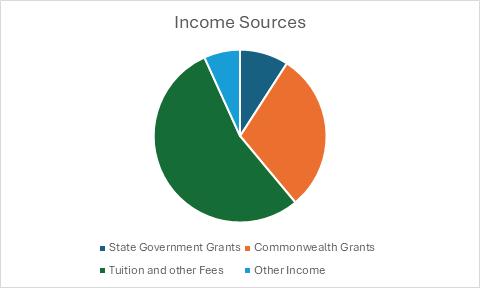
Together, these committees foster a culture of shared responsibility and forward-thinking leadership. They provide the operational structure and oversight needed to ensure the School is managed effectivelyupholding the values of integrity, accountability, and continuous improvement that underpin our vision for educational excellence.